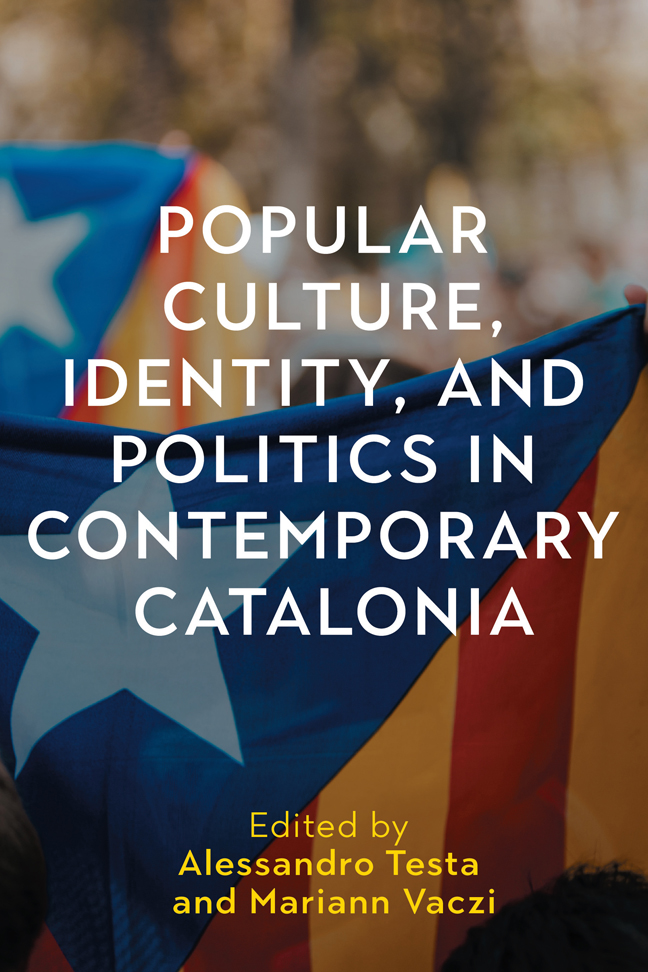Book contents
- Frontmatter
- Contents
- List of Illustrations
- List of Contributors
- Introduction: Culture, Identity, and Politics in Contemporary Catalonia
- 1 Castells, Myths, and Allegories of Nation-Building
- 2 The Ritual Making of Central Catalonia 1: National Identity and the Hanging of the Donkey
- 3 The Ritual Making of Central Catalonia 2: Comparses and the Dynamics of Inclusive Nationalism
- 4 Reclaiming the Cathar Past: At the Crossroads between Identity Politics and Tourist Economies in Catalonia
- 5 The Heritage of the Humiliated: Popular Resistance in Defense of the “Bous” in the Lands of the Ebro
- 6 Communities without Festivities? Community Effects, Transformations, and Conflicts after Covid-19 in Catalonia
- 7 Bon Profit! Food as National Identity in Catalonia
- Afterword: Beneath the Nation: Collective Creation and Civic Need
- Bibliography
- Index
Introduction: Culture, Identity, and Politics in Contemporary Catalonia
Published online by Cambridge University Press: 02 March 2024
- Frontmatter
- Contents
- List of Illustrations
- List of Contributors
- Introduction: Culture, Identity, and Politics in Contemporary Catalonia
- 1 Castells, Myths, and Allegories of Nation-Building
- 2 The Ritual Making of Central Catalonia 1: National Identity and the Hanging of the Donkey
- 3 The Ritual Making of Central Catalonia 2: Comparses and the Dynamics of Inclusive Nationalism
- 4 Reclaiming the Cathar Past: At the Crossroads between Identity Politics and Tourist Economies in Catalonia
- 5 The Heritage of the Humiliated: Popular Resistance in Defense of the “Bous” in the Lands of the Ebro
- 6 Communities without Festivities? Community Effects, Transformations, and Conflicts after Covid-19 in Catalonia
- 7 Bon Profit! Food as National Identity in Catalonia
- Afterword: Beneath the Nation: Collective Creation and Civic Need
- Bibliography
- Index
Summary
For many, Catalonia is a conundrum. An extraordinary case of collective effort, identity assertion, and political escalation, it has been one of the greatest if not the greatest cause of political polarisation in Spanish society for more than a decade now and one of the many thorns in the side of the EU and its institutional bodies, continually faced with a cascade of political, ideological, and juridical quandaries. A relatively recent phenomenon as a set of mature socio-cultural claims and coherent political vision, Catalan regionalism or nationalism (catalanisme), and its more radical manifestation, independentism (independentisme), are one of the not unique but rare examples of nationalism that is upheld eminently (though not exclusively) by progressive parties, and which identifies with and seduces especially ‘the left’. This leaves many, but not scholars of nationalism, rather puzzled, for as one of the most prominent among them once remarked, nationalism is a protean phenomenon formed of different concepts, representations, and practices, whose different combinations ‘point them in different directions, creating the various kinds of nationalism with which we are familiar’ (Smith 2013, 36). Catalan independentisme has been noted for its bottom-up civil mobilisation that aims for secession from Spain due to an accumulating set of (real or imagined) grievances over cultural, linguistic, economic, and political matters since the Transition from the Franco dictatorship and especially in the past decade. This volume will address how these developments are both constructed and reflected by/in popular culture.
Along with notions such as ‘culture’, ‘religion’, ‘tradition’, and others, ‘nation’ is one of the ontological black diamonds in the historical and social sciences: a terminological crystal of many facets, absorbing, reflecting, and deflecting definitions and semantic boundaries, and yet, in spite of its polysemy and hazy aura, inevitable, just like those other concepts, in use and thought both emically and etically. There can be no doubt that the gravitational force of nations permeates our lives, shaping the configuration of our states, their sense of the past, their vision of the future, and the public and political debates of our time as much and perhaps even more than in certain periods of the 19th and 20th centuries. Far from being relegated to the past, nations, nationhood, and nationalisms are as much alive today as they have ever been.
- Type
- Chapter
- Information
- Publisher: Boydell & BrewerPrint publication year: 2023

